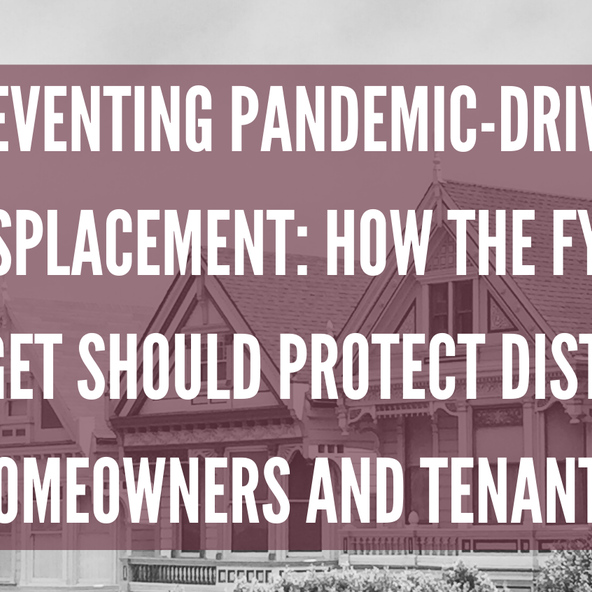
In this post, we continue our discussion of Legal Aid’s priorities for the District’s Fiscal Year (FY) 21 budget, including recommendations designed to ensure that all District residents experience a true economic recovery. Having discussed steps the District should take to strengthen key safety net programs, we turn to steps the District must take to prevent displacement, an already-existing problem that an extended economic downturn has the potential to make worse.
Before this crisis, the District was already experiencing some of the most intense gentrification in the country, with more than 20,000 African-American residents displaced from the District between 2000 and 2013. Rising housing prices have made it much more difficult to stay in the District, and stories of the District’s economic growth in the years following the Great Recession have masked a much more complex and problematic reality: that as late as 2018, unemployment among the District’s black residents still hadn’t recovered to pre-recession levels, and that the District continues to suffer from extreme racial income and wealth gaps – one that has left black Washingtonians much more vulnerable than their white counterparts to the impact of the current economic crisis. As our community struggles with the consequences of job losses and underemployment in the coming months, there is the potential for even more long-time District residents, many of whom will be black, to be forced out of the District as they find themselves unable to afford rents and mortgages. As an organization committed to racial justice and representing low-income District residents in both foreclosure and eviction matters, we are concerned about what this crisis will mean for both homeowners and tenants.
The District Must Fund Foreclosure Prevention Assistance in the FY21 Budget
As increasing numbers of homeowners face job losses, as well as a sluggish labor market, it is extremely likely that more District residents will fall behind on mortgage payments and be at-risk of foreclosure. Even in the years before this pandemic, the number of active foreclosure cases in the District remained high – even after foreclosure numbers began to decline across the country – with the District’s overall prosperity masking the precarious positions of many low and middle-income District homeowners. An extended economic downturn due to COVID-19 is likely to swell the number of District homeowners in this position.
We urge the Mayor to ensure that the District Government is ready to help homeowners with limited incomes avoid foreclosure and the displacement that would inevitably result. Prior to the pandemic, Legal Aid recommended that the District’s Housing Finance Agency (HFA) explore getting permission from the Federal Government to re-open the previously-closed federally-funded Homesaver program to assist homeowners facing the potential loss of their homes. The drastically-changed circumstances on the ground in the District makes this recommendation more urgent. Even in the absence of federal assistance (whether through Homesaver or some other federal intervention), the Mayor and the Council should designate local funds to help low-income homeowners remain in their homes so as to avoid accelerating the District’s alarming displacement trend.
The District Must Fund Emergency Rental Assistance and Renew its Commitment to Affordable Housing
Low-income tenants are in serious danger as well, as a combination of already-high rents and rising unemployment and under-employment will leave many tenants unable to afford their current rents, or find alternative affordable housing in the District. The District has a ready-made prevention tool for at least some of this potential displacement in the form of the Emergency Rental Assistance Program (ERAP). But even in relatively good economic times, the program frequently runs out of money before the end of each fiscal year and can only provide assistance to certain populations. In the wake of COVID-19, demand will be even higher among the current targeted populations – households with children, elderly households, and people with disabilities – and other low-income residents.
We urge the Mayor and Council to substantially scale up ERAP funding in FY21, and to expand eligibility to reach a broader population of low-income District residents. Preventing low-income District residents from losing their housing through emergency assistance is a relatively modest intervention – far less costly than serving evicted residents through other homeless services programs and far less disruptive to households and communities than allowing residents to be displaced from the District entirely.
And while we recognize that the fiscal environment presents challenges, we urge the Mayor to maintain her commitment to the building and preservation of affordable housing. Such a commitment entails yearly investments in the Housing Production Trust Fund to ensure production of affordable housing in the medium-to-long term, with matching operating subsidies through the Local Rent Supplement Program (LRSP) to ensure the Trust Fund meets its statutory requirement of at least 50 percent of funded units being deeply affordable. And in the immediate term, funding is still necessary for sorely needed repairs to unsafe public housing and pulling people off the waiting list for permanent housing vouchers.
In the wake of this crisis the number of people in need of affordable housing will grow, not decline, and we need to have interventions in place to ensure that District residents who are struggling can remain here in the District through the coming recovery.




